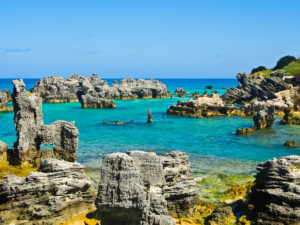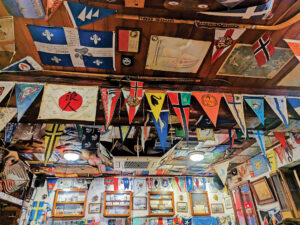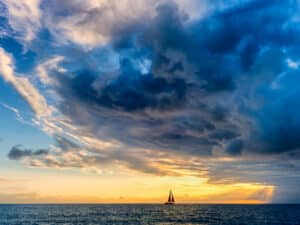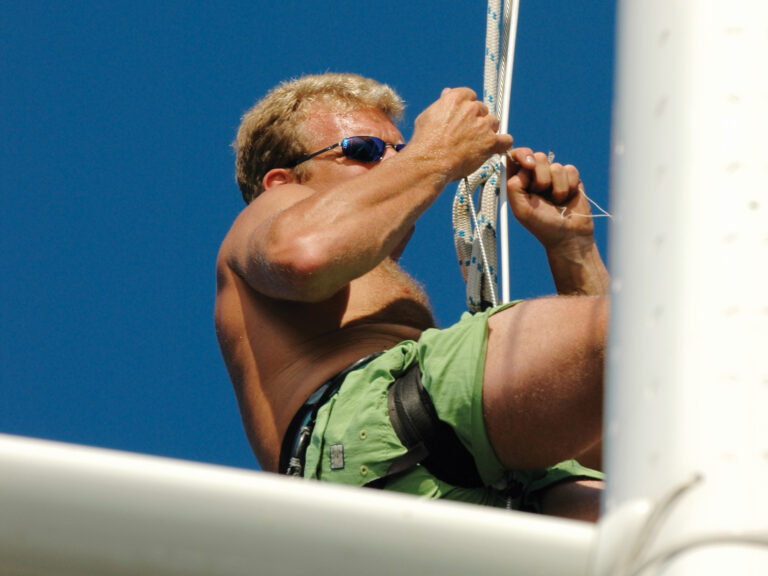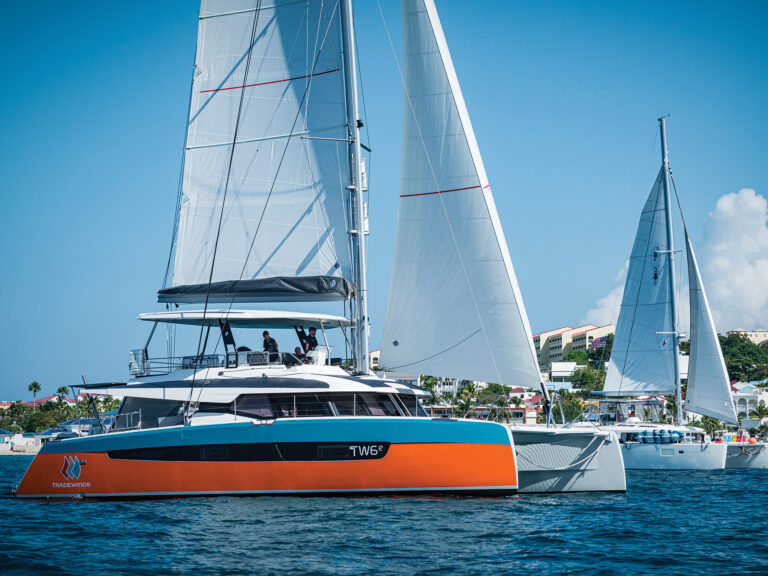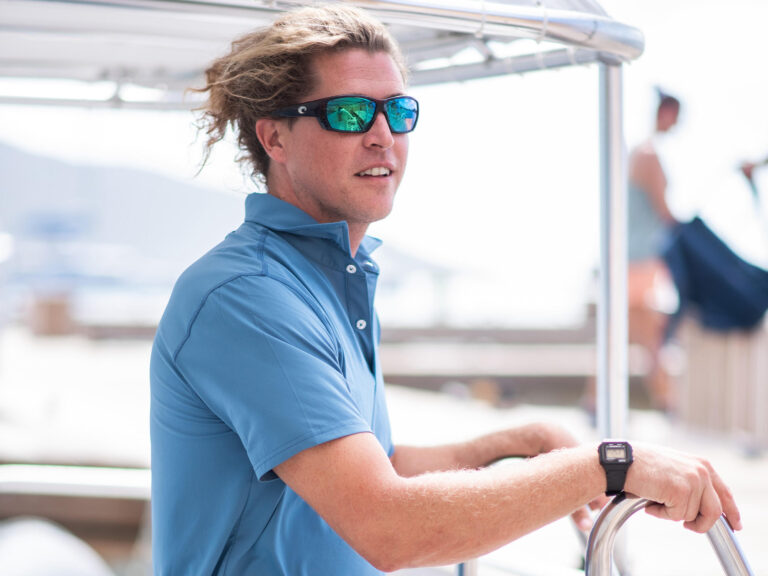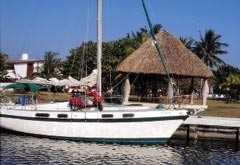
CO6THERESA01.jpg
In February 2001, Jan Kwapinski cast off from Key West and sailed his Tartan 27, Janek, to Marina Hemingway in Havana, Cuba. Kwapinski cleared in with Cuban officials and spent three days on the island, where he says he traveled by bicycle (his own) and ate and slept aboard his boat. When a weather window opened, he sailed back to Key West. Almost anywhere else in the world, such a voyage would’ve been no big deal. But, as Kwapinski and many other American sailors are finding out, the 90-mile trip to Fidel Castro’s homeland is no ordinary sail.
One year after returning to the United States, Kwapinski received a notice from the director of the U.S. Department of the Treasurys Office of Foreign Assets Control (OFAC; www.treas.gov/ofac) informing him that the office intended to fine him $7,500 for his amble south.
“I couldnt believe it,” Kwapinski said. “I didnt break any laws. I read all the regulations; I knew I couldnt spend money there, and I didnt.” Now, the U.S. government is telling Kwapinski either to prove that his story is true or pay up.
Forty years of history and political posturing have roiled the waters separating Key West and Havana. Although thousands of Americans have cast off from Floridas shores in the last decade with a wink at the U.S. policy on Cuba, many now find themselves returning to a barrage of government questions and fines. Since last summer, the U.S. Treasury Department has stepped up its enforcement of regulations prohibiting trade with Cuba and has been coming down hard on Americans who visit without a license. The number of inquiries and fines sent out by OFAC has quadrupled.
In 2001, the first year of the Bush administration, OFAC sent out 698 pre-penalty letters similar to the one Kwapinski received, according to Tasia Scolinos, spokeswoman for the Treasury Department. Thats compared with 178 letters in 2000.
“Its hard to be general and say everybody that visits Cuba gets a letter,” Scolinos said. “We do it on a case-by-case basis. If the government has reason to believe that [you] spent money, then youll get a letter. Most people who get the pre-penalty letter come to a settlement.”
Although OFAC officials say theyre simply enforcing a rule thats been on the books for decades, the administration change at the White House has brought a tide change that Cuba-bound sailors need to understand. The number of fines OFAC issued shot up last summer after President Bush announced he would enforce the regulations “to the fullest extent” –624 of the years 698 letters were sent in the last eight months–and in March, a State Department official told Congress the Bush administration intends to further tighten all restrictions against Cuba.
Trading with the Enemy
In plain English, it’s not illegal for U.S. citizens to visit Cuba, but it is illegal for U.S. citizens to spend any amount of money there, in any currency. Shortly after Castro took power in 1959, the United States implemented a set of regulations designed to financially strangle the regime. Called the Cuban Assets Control Regulations, these restrictions were drawn up under the 1917 Trading with the Enemy Act and “severely restrict” travel to the island and forbid all trade. These regulations apply whether an American travels directly from the United States or via a third country. The Treasury Department, specifically OFAC, is in charge of enforcing this economic embargo. There are exceptions to the embargo, and Americans traveling under a legal license are allowed to spend a set daily amount. Licenses are available from OFAC for some journalists, diplomats, politicians, academics, athletes, art collectors, humanitarian groups, and students. In addition, Cuban Americans are allowed an annual trip to the island to visit relatives.
One loophole in the trade embargo cruisers have been squeezing through is the “fully hosted” exemption. “Fully hosted” cruisers, who travel to Cuba without an OFAC license, claim that a person not subject to U.S. laws covered all of their expenses while they were in Cuba. Marina Hemingway in the past has sponsored fully hosted sailors, providing a letter that says all marina fees were covered by the host. But, says OFAC, a letter waiving marina fees isnt enough. New wording inserted in the Cuba regulations in 1999 says individuals must “overcome the presumption” that theyve engaged in unlicensed travel-related transactions. And even if you plan to eat all your meals on your boat and sleep on your boat, OFAC says, visitors must account for the cost of a Cuban visa, a cruising permit, entry fees, departure fees, and even taxis. One beer in Old Havana could cost as much as $250,000 in fines and 10 years in prison.
Kwapinski claims he bought all his food, water, and fuel in Florida and that a Canadian and a German friend (both in Cuba aboard their own boats) paid his marina fees. OFAC has asked him to provide receipts to that effect and to submit original signed statements from his hosts.
“I dont keep any grocery bills or things like that for a year,” Kwapinski said. He responded to OFAC in January with a letter stating he didnt believe hed broken any laws, and he requested a hearing. At press time in April, he was still waiting for OFACs response.
Regulation Gumbo
Another American cruising sailor, “Michael,” who asked that his name not be used until he has sorted out his legal situation, traveled to Cuba with his father and four friends in March 2001. Exactly one year later, he received from OFAC a daunting letter suggesting the prospect of a huge fine.
“Wed wanted to go to Cuba for years,” he said. “My father and I grew up on my grandfathers stories of Cuba. Hed visited the island before Castro.” Michael said that from what hed heard from other cruisers, sailing to Cuba wasnt that big a deal and that so long as they played by the rules, they wouldnt get into trouble with the U.S. government. The group obtained fully hosted status from Marina Hemingway, and his father, the captain of the boat, obtained the necessary “permission to clear the security zone” from the U.S. Coast Guard before leaving Florida.
In February 1996, the Cuban military shot down two U.S. civil aircraft in international airspace. The planes were operated by Brothers to the Rescue, a Cuban exile group that the Cuban government accused of illegally entering Cuban airspace and fomenting dissent. Since then, American cruisers have been required to obtain permission to depart the Coast Guard security zone surrounding the Florida peninsula. The permit takes only a day to obtain. But, as the Coast Guard points out, it doesnt qualify as a license to travel or to engage in trade. The permit simply helps the Coast Guard keep track of boats entering “enemy waters.” The information on the application is forwarded to OFAC, and failure to obtain the permit before sailing directly from the U.S. to Cuba can result in the seizure of the vessel, a $250,000 fine, and 10 years in prison.
The U.S. Customs Service has it own role in enforcing the embargo. When U.S. citizens return to the States from Cuba, customs officials routinely inspect the boat for Cuban goods and ask the captain and crew to fill out a questionnaire. Michaels father was asked to complete this three-page written “interview” when his boat returned to Florida.
One Key West customs official said he sees anywhere from 12 to 20 boats a week arriving from Cuba, including foreign-registered boats.
“We ask [U.S. citizens] to fill out a fairly detailed statement–where they went, why they went, what they went on,” he said. “We get as much info from them as we can, and we send that on to Washington. All of it goes to D.C., even if they have a license.
“Most of the boats that come in say that they were fully hosted. With the fully hosted status, you still have to pay visas, permits, so thats bullshit to say youre not spending money. If youre going to go, youre going to spend some money.
“Frankly, [the regulations] havent been enforced that much in the past. We might have taken a case of [Cuban] cigars someone was bringing in and dumped it overboard. Now, if we see even one cigar, we confiscate it and send it to Miami.
“If [U.S. sailors] are going now, theyre going to take their chances,” the customs official said. He estimates that “20 to 30 percent of the boats [returning from Cuba] just dont check in.”
Michael said that although his crew decided to do everything by the book, he met “quite a few [people on] American boats” at Marina Hemingway who say they visit regularly and never tell the Coast Guard or customs. He didnt think the customs interview was anything he had to worry about until his father received an OFAC inquiry letter in December and he received one in March.
“What now?” he thought when he looked through the letter.
“Youre a little less cavalier about it when you get this six-page form from the federal government asking everything you did and telling you about thousands of dollars in fines,” he said. “Having your own government come after you is a very intimidating thing.”
Bring On the Lawyers
For years, the Center for Constitutional Rights in New York City (www.ccr-ny.org) has accepted Cuban travel cases like Michael’s, but a recent backlog of more than 400 such cases became so heavy it began referring people elsewhere.
“I think the embargo would be particularly offensive to people who sail,” said Nancy Chang, an attorney at CCR. “They tend to be independent souls and appreciate the ability to wander the world. I imagine [if they] travel to Cuba and come back to the U.S. only to be fined $7,500 for simply paying for their visa, it shows them the senselessness of it. Its contrary to our constitution, our values. Were proud of our tradition of allowing people to make up their own minds and travel freely around the world. We should let others know about our freedoms.”
Chang said that although cruisers say they travel fully hosted, one would still have to “overcome the presumption,” as OFAC says, that one spent money. In other words, youre guilty until proven innocent. Although CCR hasnt seen anyone charged with a criminal case–OFACs pre-penalty notices, like the one Kwapinski received, threaten civil fines but not criminal prosecution–the fact that the accused must bear the burden of proof is something defense lawyers could challenge. Chang says the regulations originated from a national emergency thats long gone; the “compelling government interest” needed to deny the rights of citizens just isnt there, she says. If a case ever goes to trial, CCR plans to argue that the Cuba regulations are a denial of rights granted in the First Amendment.
Betting on the Backlog
Kwapinski and Michael hope for a quick resolution, but that seems unlikely. OFAC also has a backlog of nearly 400 Cuban travel-related cases. And although OFAC is in charge of enforcing the Cuban regulations, in the past they haven’t had a budget to hire judges if someone asks for a hearing. Treasury spokeswoman Scolinos said the department was set to move ahead on the hearings late last summer, but the issue was put on the back burner after September 11, when OFAC’s resources were needed to investigate and freeze terrorists’ assets. Scolinos said OFAC is again working on the hearing process, and it’s “set to roll.”
The National Lawyers Guild (www.nlg.org) has developed a form-letter response for anyone whos received an inquiry letter (like Michaels) or a pre-penalty notice (like Kwapinskis). These letters say OFACs travel regulations and OFACs demands for information violate the First and Fifth Amendments, including the right against self-incrimination.
Michael said hed originally planned to “hide under the umbrella of the fully hosted status,” but hes now decided to refuse to provide OFAC with information on the grounds of possible self-incrimination.
What the Politicians Say
For two years running, the U.S. House of Representatives has passed proposals to prohibit the Treasury Department from spending money to enforce the embargo; last year, the House attached the proposal to a $17 billion appropriations bill, and for that reason, President Bush threatened to veto the entire bill. The proposal was stricken from the bill while it made its way through the Senate.
On March 14, U.S. Treasury Secretary Paul ONeill told the Senate Appropriations Subcommittee hed prefer to see the Treasury Department spend its budget cracking down on terrorists rather than pursuing tourists who visit Cuba, an opinion shared by the committee chairman, Senator Byron Dorgan (D-ND). Dorgan said he hoped OFAC “would understand that theres a greater need to deal with the terrorist threat these days than the threat of a retired teacher bicycling through Cuba.” ONeill said he agreed.
In the House, Arizona Republican Jeff Flake and Massachusetts Democrat William Delahunt have put together a bipartisan coalition to do away with the regulations. This would not only make life easier for U.S. sailors; more important, from a political point of view, it would also open up lucrative markets for corn, soybean, and other U.S. products.
Such efforts will face strong opposition from Florida politicians. Two Florida representatives called on President Bush to dismiss ONeill for his remarks regarding the embargo.
The Bush administration hasnt overlooked Floridas pivotal role in putting George W. in the White House, and neither have the conservative Cuban Americans in South Florida, who vehemently oppose easing the trade embargo and travel ban. The presidents brother, Florida governor Jeb Bush, is up for re-election in November, and like the president, he counts the anti-Castro forces as an important part of his constituency.
Ironically, Cuban Americans make up the largest group of individuals who travel to Cuba. The U.S. Trade and Economic Council estimates 176,000 Americans visited Cuba in 2001, including 124,000 Cuban Americans and 22,000 people who traveled there illegally.
Joe Garcia, executive director of the Cuban American National Foundation (CANF), said he would love to see his homeland–but travel to Cuba is a violation of U.S. law, and that law should be enforced like any other.
“Cuba is a terrorist state that harbors fugitives from justice,” Garcia said. He doesnt buy the argument that foreign tourists are helping to promote change in Cuba.
No More Regattas
In the spring of 2000, OFAC ordered the organizers of the Tampa Bay-based Havana Cup, an annual sailing regatta from Tampa to Havana, to “cease and desist.” Five months later, OFAC sent the same notice to the organizers of the Conch Republic Cup, an annual sailing regatta between Key West and Cuba. Doran Cushing, editor of the magazine Southwinds, based in St. Petersburg, Florida, said that 60 boats from the Havana Cup went to Cuba in 2000 even though the race was officially cancelled. The Conch Republic Cup became a regatta to Sand Key (off the Florida Keys), and a “bunch of boats went to Cuba on their own after that,” Cushing said.
“They violate the embargo,” Cushing said. “Im not denying that. Its unfortunate that the government puts us in the position to lie. All I can say is, if youre going, keep your receipts and be ready to show that you were self-sufficient. Keep a diary; show you rode your bicycle.”
Despite all the troubled water, Americans desire to see Cuba remains strong. Kwapinski points out that although he only had to wait a day for the Coast Guard permit, he had to wait 10 days for a Cuban courtesy flag from West Marine. West Marine Key West store manager Jeff Jannausch said they sell about 100 Cuban courtesy flags a year. “Plenty of people are passing through from foreign countries and buying the flags, so it doesnt say how many Americans are going,” he said. “But it does show how popular Cuba is as a cruising destination.”
“I didnt [travel to Cuba] to prove some political point,” Michael said of his trip. “Its bizarre that its one of the only countries we arent allowed to go to. I think, because Cuba is a poor place, were able to refuse to do business with them. But theres a lot of hypocrisy there, because in other countries, we just go ahead–China, Russia.”
“Its a game,” Cushing said. “The rules have changed. You gotta know the rules now, and you gotta play by those rules.”
Theresa Nicholson, who cruised aboard the 32-foot Atkin ketch Tosca for 10 years, lives in Portsmouth, Rhode Island.

